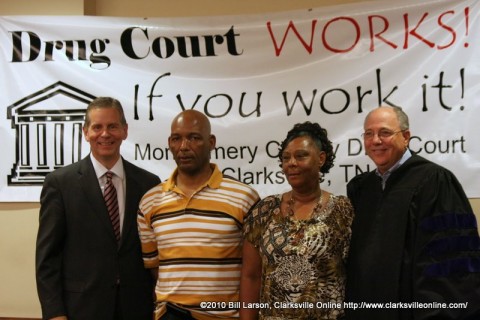 Drug Courts have become a popular method for dealing with drug offenders without resulting to the expense of incarceration. 85 participants have been accepted into the Montgomery County Drug Court program since its inception in 2005. 28 participants have graduated the local program, including Ruby Hendrickson and John Young who graduated on Friday.
Drug Courts have become a popular method for dealing with drug offenders without resulting to the expense of incarceration. 85 participants have been accepted into the Montgomery County Drug Court program since its inception in 2005. 28 participants have graduated the local program, including Ruby Hendrickson and John Young who graduated on Friday.
Ruby Hendrickson completed the program with 813 days of sobriety in just over two years. “I am a grateful recovering addict, I want to thank Drug Court for coming into my life. It was hard but I did it. When I started, I was scared, I was mad. I ended up spending a year away from my family, but I stuck with the program.”
John Young was in the program for about 3-1/2 years and completed the program with 228 days of sobriety. Young credited his faith with helping him to complete the program. “It’s been a long three years.” he said.

State Representative Joe Pitts told the graduates that “You are an inspiration to the people in this room” he also encouraged the new graduates to become stay involved in the Drug Court program. “Everyone has a story to tell, and no one can tell your story better than you.”
Judge Elizabeth Rankin also received recognition for her service to the Drug Court during her time in office.
According to Sherry Robertson, the Director of Montgomery County Adult Court Services, “Drug Courts Work” she said, “Nationally, 75% of Adult Criminal Drug Court graduates never see another pair of handcuffs…”
Drug Courts got their start when the Dade County Circuit Court developed an intensive, community-based, treatment, rehabilitation, and supervision program for felony drug defendants in 1989 to address rapidly increasing recidivism rates. Less than twenty years later, there are more than 2,140 Drug Courts in operation with another 284 being planned or developed.
The local Drug Court has 4 Phases participants must work through.
- Participants must first complete an inpatient treatment when they are enrolled into Drug Court.
- Upon completion of treatment, participants must attend AA/NA meetings; secure and maintain a sponsor; have random drug screens (range from daily to weekly to bi-weekly in phase 4); secure and maintain full-time employment; work on their GED or HS diploma if they do not have one when they enter the program; complete community service hours (and a host of other requirements based on the individual treatment plan)
- They also must attend court for weekly reviews in phases 1 & 2; bi-weekly in phase 3 and monthly in phase 4 (at a minimum)
The Drug Court program is funded by two grants (1 from the Office of Criminal Justice Programs, the ARRA grant), participant fees and community donations (which are tax-exempt).
The Drug Court team consists of – Judges Ray Grimes & Elizabeth Rankin; Assistant District Attorney Bill Cloud, Assistant Public Defender Fred Love; Director Sherry Robertson; Coordinator Tobi Young; Probation Officer James Herriman; Deputy Clerk Denise Williams; Treatment Provider Deborah Clark from Bradford Health Services; Evaluator Pete Stoddard – APSU; Police Officer Ray Colon – CPD; and Drug Court Alumni Stacey Baggett.
Photo Gallery
Graduation Requirements
Graduation requirements for the Montgomery County Drug Court Program are not negotiable. Each petitioning graduate must meet the following requirements as a minimum prior to meeting the Drug Court Team for graduation consideration:
- Have a minimum of 120 current & continuous drug-free (days, not including any in-patient treatment time)
- Have attended 90-100% of all scheduled group and/or individual sessions
- Have attend 90-100% of all AA/NA meetings and have a sponsor
- Have a Relapse Prevention Plan
- Be crime free
- Have a minimum of 90 days continuous employment or (if approved) be enrolled in an educational or job training program
- Have adequate safe drug free housing and a support system in place
- Be willing to complete follow-up questionnaires and/or contacts for one year after graduation & be willing to return to Montgomery County Drug Court upon request during the first year after graduation






















